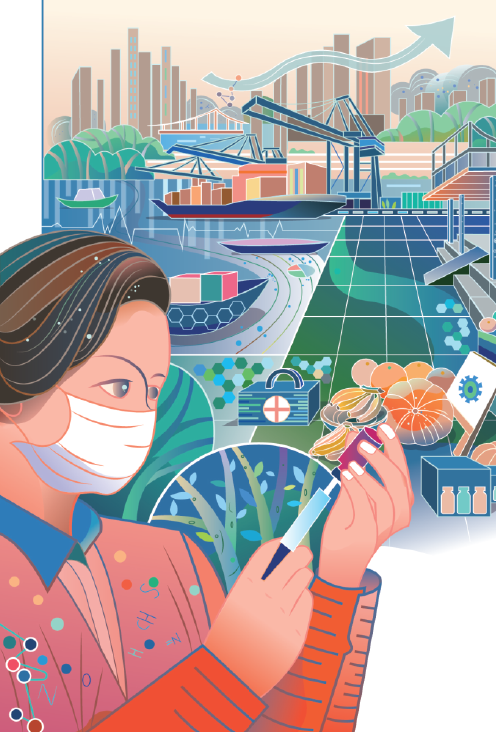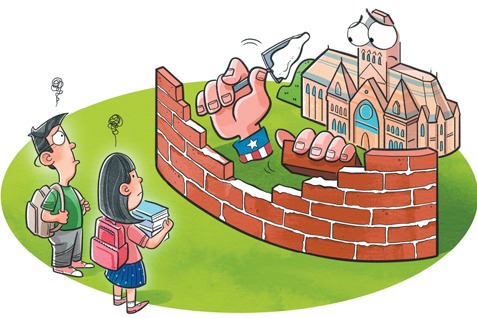Walk the talk
BRICS members should back up their words of cooperation with collective actions

BRICS members should back up their words of cooperation with collective actions

Can the BRICS countries strengthen their cooperation to boost their post-pandemic recovery? They should try, but it isn't going to be easy, not least because despite their reasonable time spent now as a group, there isn't much evidence that they have ever successfully undertaken collective policy action that has boosted their growth rates. In addition, there are considerable challenges they all face.
I have often bemoaned the fact that the BRICS political leaders have made big statements following their annual meetings, but not much has really followed. Admittedly this is not unique and other groups of countries, such as the G7, G20 and, indeed, the UN itself, often make grand statements that are often not backed up with the actions necessary for positive consequences.
When it comes to the BRICS, although each still has developing country status, their GDP per capita is quite different, with India for example around $2,000 per head, and China probably more like $10,000 to $11,000, with accordingly quite different development challenges. And of course, they are also structured quite differently politically. And to compound the challenge, some of them don't have the strongest of bilateral relationships with each other.
There are also some obvious external forces which make any efforts to boost their post-pandemic recovery challenging.
Among these, of course, as currently evidenced in China, the pandemic has not yet run its course. China is experiencing significant regional lockdowns this year to try and minimize the spread of the highly infectious Omicron variant. No doubt, other nations might have similar challenges. This said, it does seem as though the degree of COVID-19 severity is less considerable than it was, and it does mean greater implementation of vaccines and therapies are important, in terms of dealing with the remaining infections. So obviously, one area for major BRICS cooperation could be vaccine adaption and implementation. In this regard, there appears to be a lot of domestic pride about nationally developed vaccines, but it would seem rational for international cooperation to use more of those most scientifically successful.
In terms of other challenges, the ongoing risk of global inflation, and tighter monetary (and fiscal) policies in key Western countries, notably the United States and the eurozone are indirectly a risk for the rest of the world, especially due to the dominance of the Western financial system.
In this regard, the ongoing Russia-Ukraine conflict is a huge problem limiting the scope of any BRICS cooperation or indeed, global policies. The lasting high energy and food prices, caused directly by the interruption to Russian and Ukraine supplies, are a huge source of global price pressures. Indeed, any attempts at boosting economic demand might simply add to more price pressures unless lost energy and food supplies can be restored.
The global economy is currently at risk because of further monetary tightening by central banks in their fight to ensure that higher energy and food prices don't translate into a sustained inflationary environment, and the Federal Reserve Board in the United States is making it clear it plans for notable further increases in interest rates. The European Central Bank is about to start raising rates also.
Given the dominant role of the US dollar in the global financial system, as history keeps on demonstrating time after time, periods of tightening Fed policies often have adverse consequences for other parts of the world including the so-called emerging markets.
There is a structural way to move away from this reoccurring dilemma and that is for BRICS countries to deliberately encourage the use of their own currencies to play a bigger role in their individual and joint financial intermediation, both for commodity price transactions and other trade between themselves. And indeed, BRICS leaders often talk about the need for such a shift but frequently don't follow this up with strong actions to show such results. Now, there is an opportunity to do so.
So, in summary, the BRICS countries can do quite a few things to boost their post-pandemic recovery, specifically, through greater use of effective vaccines, greater actual trade with each other and true improved development of their financial systems. But, these require serious efforts and not just words.
The author is former chief economist at Goldman Sachs. The author contributed this article to China Watch, a think tank powered by China Daily. The views do not necessarily reflect those of China Daily.
Contact the editor at editor@chinawatch.cn.


































